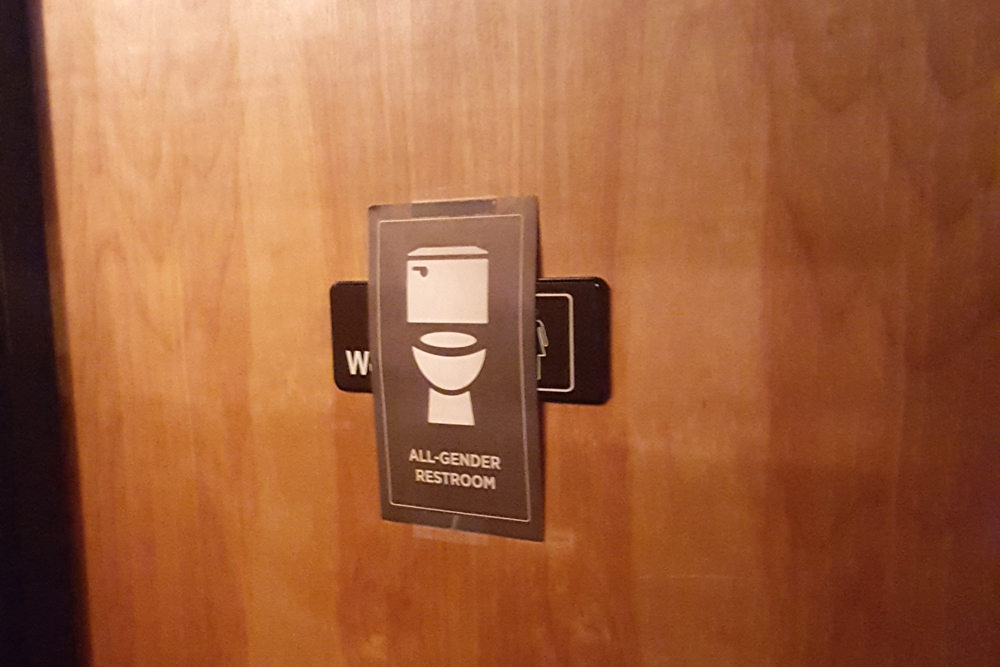By Peggy Chapman
Northwest Asian Weekly

Temporary bathroom sign at the Eastern Cafe. (Photo by Peggy Chapman/NWAW)
When was the last time you noticed the sign on your favorite restaurant or coffee shop’s bathroom? You might have seen changes recently. The new transgender bathroom signs — “Unisex,” “All-gender,” or a simple icon of a toilet — have been replacing the familiar symbols of the solo male and the solo skirted female on restroom doors in businesses, particularly new ones, throughout Seattle.
The City of Seattle instated an ordinance on Aug. 14, 2015, requiring new and existing businesses with single-use bathrooms to put up signage that states the bathroom can be used by all genders, and should not be restricted to just one. The ubiquitous icons that symbolized the strictly boys’ or girls’ room is now in the process of being replaced with signage that reflects that the bathroom can be used by either, and labeled for unisex or all genders.
Businesses subject under the ordinance were required to comply as of March 9, 2016.
A statement from a Kroger’s grocery store in Athens, Ga. posted on the bathroom in March 2015 gained national attention and explained the business’ need to replace its signage with unisex signage:
“We have a unisex bathroom because sometimes gender specific toilets put others into uncomfortable situations … we want to provide a place for our friends who are: Dads with daughters, moms with sons, parents with disabled children, those in the LGBTQ community, adults with aging parents who may be mentally or physically disabled.”
The debate for transgender signage was also highlighted by last year’s controversy with the YMCA of Pierce and Kitsap Counties, and resulted in the YMCA stating it would not discriminate based on gender identity. The Gender Justice League, which defends against oppression based on gender and sexuality in Washington state, applauded YMCA’s decision. “Though we might not always realize it, transgender people are part of our families, workplaces, our neighborhoods, and our places of worship — and they need to be able to use the restroom and locker room, just like everyone else,” a statement said.
How well is the International District (ID) doing when it comes to compliance?
An informal patron check-in was conducted of 25 businesses in the ID during June, consisting mainly of restaurants and coffee/tea houses in Little Saigon, Japantown, and Chinatown. Of these businesses, six were fairly new (opened within the last five years), while the rest were well established. Out of the 25 businesses, only one — Eastern Café, established in 2013 — had new bathroom signage, albeit with temporary printouts (pictured). The printouts are allowed while obtaining permanent signage (printouts are available at seattle.gov/Documents/Departments/CivilRights/OCR-AllGenderPostcard.pdf).
Some reasons why ID businesses aren’t complying
“It’s not surprising they aren’t,” said Matt Pechar, who works at Fort St. George and has previously worked for Bush Garden, both restaurants in the ID. Pechar thinks that most business owners are probably not aware of the issue, and if so, are probably not willing to change.
“Obstinance,” he said. “If it works, it works … Don’t change if you don’t have to.”
And then there is the navigation of the ordinance itself. Who is required to comply? The ordinance states that you are currently required to have the new signage only if the bathroom is a public, single-use bathroom (one stall in the bathroom). A larger business, which has multiple stalls, is exempt and not currently required to have the signage. However, the ordinance does suggest that it applies to multi-stall restrooms “insofar as it protects an individual’s right to use the gender-specific facility (including restrooms) that corresponds to their gender identity.”
Another consideration is the possibility of Initiative 1515 garnering enough signatures. I-1515 would repeal Washington’s anti-discrimination laws and fine violators. According to the “Just Want Privacy” campaign, the initiative would repeal the Human Right’s Commission open bathroom/shower rule, and remove liability from businesses who want to maintain gender-specific bathrooms/locker rooms. The “Washington Won’t Discriminate” campaign argues that the I-1515 “will encourage more discrimination and harassment of transgender people, and would create serious financial and legal consequences for our state’s economy, businesses, schools, and taxpayers.”
The initiative would be on the ballot in November if supporters collect 246,372 valid signatures by July 8.
However, this seems fairly unlikely — as of July 3, there were 132,408 signatures.
What happens if a business doesn’t comply?
According to the City of Seattle, the ordinance will be enforced by the Seattle Office for Civil Rights (SOCR), and “Any business determined to be non-compliant will be sent an advisory letter. If the business does not comply within 30 calendar days, it will be subject to civil penalties.” The civil penalty (a financial penalty) would be determined by the SOCR.
There is also the issue of whether compliance should be an issue — is it really that difficult for businesses to comply?
“If you don’t have it in place, it’s a matter of changing the sign or taping a piece of paper on the sign,” said Ian Butcher, architect for Best Practice Architecture and who is currently working on GoPoke, a new restaurant slated to open in Chinatown late this summer/early fall. “There are probably a lot of other issues the older businesses [in the ID] might be facing first, like addressing the American with Disabilities Act (ADA) standards.”
And along with the hindrance of change, there might actually be benefits.
GoPoke, which will be located in the vacant space at 625 South King Street, will be designed with one ADA-compliant multi-gender bathroom and another bathroom for employee use.
“The necessity and expense of creating two gender-specific bathrooms was alleviated,” said Butcher.
“It’s actually saving the restaurant money and space.”
Peggy can be reached at info@nwasianweekly.com.



